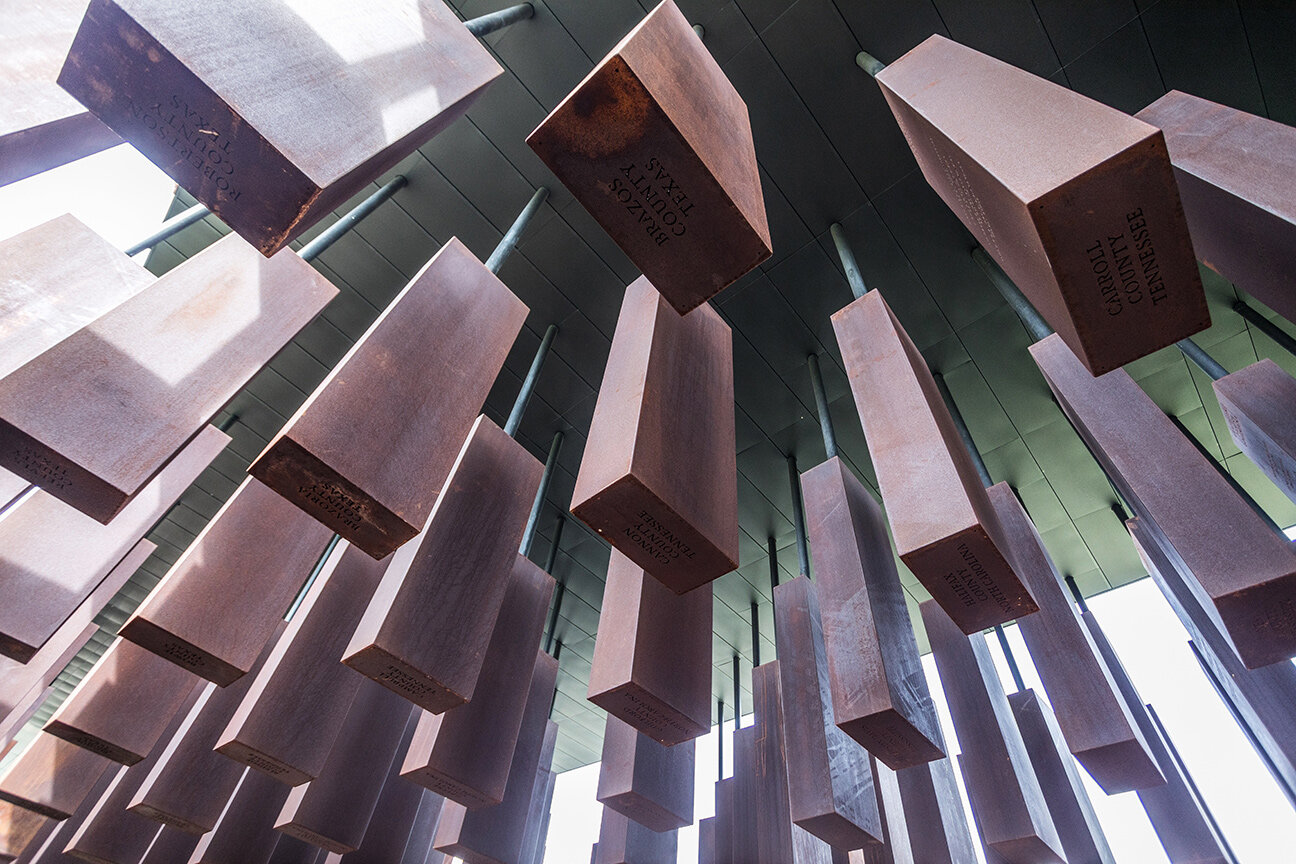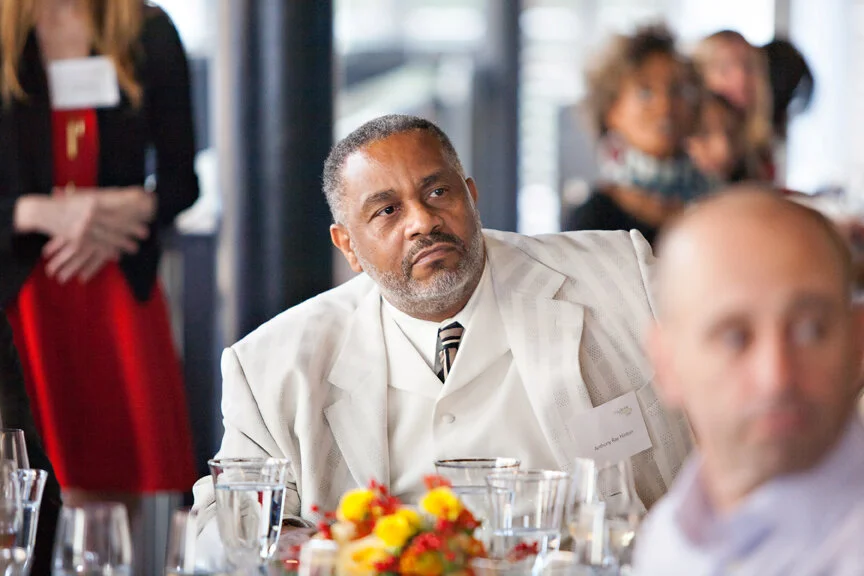
Race, Poverty & Justice
and the U.S. Criminal Justice System
Human rights day 2015 focused on “Race, Poverty & Justice”, a topic deeply rooted in social, political and economic history and profoundly relevant to current events. The program's featured speaker, Bryan Stevenson of the Equal Justice Initiative, examined the state of the criminal justice system through a human rights lens, and explored a range of issues from harsh punishments to mass incarceration, with domestic effects and international ramifications.
Featured Speaker
Bryan Stevenson
“The Opposite Of Poverty Is Not Wealth. In Too Many Places, The Opposite Of Poverty Is Justice.”
Bryan Stevenson is the founder and Executive Director of the Equal Justice Initiative in Montgomery, Alabama. Mr. Stevenson is a widely acclaimed public interest lawyer who has dedicated his career to helping the poor, the incarcerated and the condemned. Under his leadership, EJI has won major legal challenges eliminating excessive and unfair sentencing, exonerating innocent death row prisoners, confronting abuse of the incarcerated and the mentally ill and aiding children prosecuted as adults. Mr. Stevenson has successfully argued several cases in the United States Supreme Court and recently won an historic ruling in the U.S. Supreme Court banning mandatory life-without-parole sentences for all children 17 or younger are unconstitutional. Read full bio >>
“Bryan Stevenson is America’s young Nelson Mandela, a brilliant lawyer fighting with courage and conviction to guarantee justice for all.”
“Bryan Stevenson is one of my personal heroes, perhaps the most inspiring and influential crusader for justice alive today, and Just Mercy is extraordinary.”
A powerful true story about the potential for mercy to redeem us, and a clarion call to fix our broken system of justice—from one of the most brilliant and influential lawyers of our time.
Read more >>
TIME: The 100 Most Influential People
When I first heard Bryan Stevenson speak, I found myself admiring the way his gentle voice pulls you in to listen that much closer to the power behind his every word. Read more >>
Bryan Stevenson: ‘America's Mandela’
Bryan Stevenson has devoted his life to exposing racial bias in the US penal system, with cases including a 13-year-old boy sentenced to life and numerous wrongful death row convictions. Tim Adams meets him at his Alabama HQ. Read more >>
Why Desmond Tutu Thinks Bryan Stevenson Is “Shaping The Moral Universe”
Bryan Stevenson is a brilliant lawyer representing America’s conscience on a mission to guarantee equal justice for all. Over the millennia, people have asked, If God is on the side of justice, why do injustice and inequity abound on earth? When will discrimination and prejudice end? Read more >>
Special Guest
Anthony Ray Hinton
Mr. Hinton was wrongfully convicted and recently released after spending 30 years on death row. He was represented by Bryan Stevenson and the team at the Equal Justice Initiative.
One of the longest serving death row prisoners in Alabama history and among the longest serving condemned prisoners to be freed after presenting evidence of innocence, Mr. Hinton is the 152nd person exonerated from death row since 1983.
Roundtable Participants
George Gascón, San Francisco District Attorney
Mr. Gascón has earned a national reputation as a criminal justice visionary that uses evidence based practices to lower crime and make communities safer. He is the first Latino to hold the office in San Francisco and is the nation’s first police chief to become District Attorney.
Jeanne Woodford, Former Warden at San Quentin State Prison
Ms. Woodford is a criminal justice consultant, retired Chief of Adult Probation for the City and County of San Francisco, former Undersecretary and Director of the California Department of Corrections and Rehabilitation and the former Warden of San Quentin State Prison.
Bryan Stevenson, Founder and Executive Director of the Equal Justice Initiative
Mr. Stevenson is a widely acclaimed public interest lawyer who has dedicated his career to helping the poor, the incarcerated and the condemned. Under his leadership, EJI has won major legal challenges eliminating excessive and unfair sentencing, exonerating innocent death row prisoners, confronting abuse of the incarcerated and the mentally ill and aiding children prosecuted as adults.
Alison Parker, Director of U.S. Programs at Human Rights Watch
Ms. Parker guides Human Rights Watch’s work on national security, immigration, and criminal justice in the United States. From 2001-2002, she served as a Sandler fellow and the organization's director of refugee policy, in both positions documenting and advocating against violations of the rights of refugees around the world.
Randy Newcomb, President and CEO, Humanity United [Moderator]
As President and CEO, Randy Newcomb leads all aspects of Humanity United’s strategic planning, development, and operations. He works closely with the organization’s founders and Board of Trustees to ensure that Humanity United achieves its long-term mission and strategic objectives.
Dana King, Commissioner, Oakland Public Ethics Commission and Distinguished Journalist in Residence at Dominican University of California [Master of Ceremonies]
Dana King traveled the world during her 25-year career as a broadcast journalist. She reported from Afghanistan, Iraq, Israel, Jordan, Turkey, Taiwan, Kosovo, Central America, Ghana and Rwanda. King is the recipient of 5 Emmy Awards. She also earned an Edward R. Murrow Award for her reporting on the aftermath of the Rwandan Genocide.
Event Images
Resources
Lynching In America: Confronting The Legacy Of Racial Terror
Equal Justice Initiative
Lynching in America: Confronting the Legacy of Racial Terror documents EJI’s multi-year investigation into lynching in twelve Southern states during the period between Reconstruction and World War II.
The New Jim Crow By Michelle Alexander
The New Jim Crow is a stunning account of the rebirth of a caste-like system in the United States, one that has resulted in millions of African Americans locked behind bars and then relegated to a permanent second-class status.
What I Learned In Jail As A Kid, Ismael Nazario
TED
As a teenager, Ismael Nazario was sent to New York’s Rikers Island jail, where he spent 300 days in solitary confinement — all before he was ever convicted of a crime.
Racism In America: How Did We Get Here?
Bill Moyers
The protests that erupted following the deaths of unarmed black men by police officers in Ferguson and New York have led us closer to a “national conversation on race in America.”
The New York Times
SOME white Americans may be surprised to hear Archbishop Desmond Tutu describe Bryan Stevenson, an African-American lawyer fighting for racial justice, as “America’s young Nelson Mandela.”
Juveniles Need A Chance, Not Life In Prison
NPR
R. Dwayne Betts is a poet, memoirist and teacher. At 16, Betts pleaded guilty to carjacking and was sentenced to nine years in prison. He is the author of A Question of Freedom: A Memoir of Learning, Survival, and Coming of Age in Prison.
Need To Know: Life Without Parole
PBS
The Supreme Court ruled last month that juveniles can no longer be sentenced to life in prison without the possibility of parole for non-homicide crimes. Need to Know looks at the case of Joe Sullivan, who was convicted to life in jail at the age of 13.
Dispatches: Saving US Children From The Death Penalty
Human Rights Watch
Ten years ago this month, the United States Supreme Court found the death penalty unconstitutional when imposed on people who committed crimes when they were younger than age 18.
The Half Has Never Been Told: Slavery And The Making Of American Capitalism By Edward E. Baptist
Americans tend to cast slavery as a pre-modern institution—the nation’s original sin, perhaps, but isolated in time and divorced from America’s later success. But to do so robs the millions who suffered in bondage of their full legacy.
Solutions: American Leaders Speak Out On Criminal Justice
The Brennan Center
Mass incarceration. In recent years it’s become clear that the size of America’s prison population is unsustainable – and isn’t needed to protect public safety. In this remarkable bipartisan collaboration, the country’s most prominent public figures and experts join together to propose ideas for change.
You Can’t Reform The Criminal Justice System By Cutting Costs
The New Republic
The current bipartisan consensus on the need to pursue criminal justice reform has been heralded—again, and again, and again—as the long-awaited agreement that ends mass incarceration and its many ills: the incredible size and the exorbitant cost of the police and prison system; the qualities of discrimination and poverty that lead to arrests; and the preeminence of incarceration as social policy.
Mass Incarceration: The Silence Of The Judges
The New York Review of Books
For too long, too many judges have been too quiet about an evil of which we are a part: the mass incarceration of people in the United States today. It is time that more of us spoke out.
Partners

Special Thanks to Our Honorary Host Committee
Supervisor London Breed, Shannon Sedgwick Davis, Carla Emil, Will Fitzpatrick, Attorney General Kamala Harris, Van Jones, Tracy Mack Parker, Areyh Neier, Randy Newcomb, Lt. Governor Gavin Newsom, Jean Oelwang, Sally Osberg,
Congresswoman Nancy Pelosi, House Democratic Leader, Anthony Romero
and Ken Roth


















































































































































































